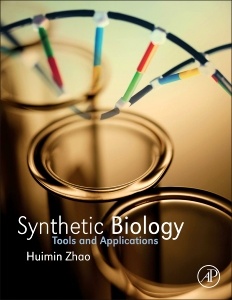Synthetic Biology Tools and Applications
Coordonnateur : Zhao Huimin

IntroductionSection I. Synthesis and engineering tools in synthetic biology1. DNA synthesis 2. Protein engineering 3. Pathway engineering 4. Biological standardization
Section II. Computational and theoretical tools in synthetic biology5. Biocomplexity issues in synthetic biology 6. Computational protein design7. Computer-Aided Design in Synthetic Biology8. Computational tools for strain design
Sections III. Applications in synthetic biology9. Pathway/network level: design and applications of therapeutic genetic circuits 10. Pathway/network level: production of drugs 11. Pathway/network level: synthesis of new fuels 12. Organism level: genome assembly 13. Multi-cell level: synthetic prey-predator system
Section IV. Future prospects14. Design of artificial cells15. Cell-free synthetic biology 16. Artificial photosynthesis 17. Engineering synthetic ecosystems
Geneticists, molecular biologists, physicists, chemists, and bioengineers
Dr. Huimin Zhao is the Centennial Endowed Chair Professor of chemical and biomolecular engineering, and professor of chemistry, biochemistry, biophysics, and bioengineering at the University of Illinois at Urbana-Champaign (UIUC). He received his B.S. degree in Biology from the University of Science and Technology of China in 1992 and his Ph.D. degree in Chemistry from the California Institute of Technology in 1998 under the guidance of Dr. Frances Arnold. Prior to joining UIUC in 2000, he was a project leader at the Industrial Biotechnology Laboratory of the Dow Chemical Company. He was promoted to full professor in 2008. Dr. Zhao has authored and co-authored 150 research articles and 20 issued and pending patent applications with several being licensed by industry. In addition, he has given plenary, keynote or invited lectures in more than 170 international meetings and institutions. Eight of his former graduate students and postdocs became professors in the US and other countries.
Dr. Zhao received numerous research and teaching awards and honors, including Guggenheim Fellowship (2012), Fellow of the American Association for the Advancement of Science (AAAS) (2010), Fellow of the American Institute of Medical and Biological Engineering (AIMBE) (2009), American Institute of Chemical Engineers (AIChE) Food, Pharmaceutical, and Bioengineering Division Plenary Award Lecturer (2009), the American Chemical Society (ACS) Division of Biochemical Technology Young Investigator Award (2008), Outstanding Overseas Young Chinese Scholars Award (2007), DuPont Young Professor Award (2005), National Science Foundation CAREER Award (2004), Dow Chemical Special Recognition Award (1999), Xerox Award for Faculty Research from UIUC College of Engineering (2005), Petit Scholar from UIUC College of Liberal Arts and Sciences (2006), and University Scholar from UIUC (2007). Dr. Zhao served as a consultant for over 10 companies such as Pfizer, Maxygen, BP, Gevo, and zuChem, and a
- Includes contributions from leaders in the field presents examples of ambitious synthetic biology efforts including creation of artificial cells from scratch, cell-free synthesis of chemicals, fuels, and proteins, engineering of artificial photosynthesis for biofuels production, and creation of unnatural living organisms
- Describes the latest state-of-the-art tools developed for low-cost synthesis of ever-increasing sizes of DNA and efficient modification of proteins, pathways, and genomes
- Highlights key technologies for analyzing biological systems at the genomic, proteomic, and metabolomic levels which are especially valuable in pathway, whole cell, and multi-cell applications
- Details mathematical modeling tools and computational tools which can dramatically increase the speed of the design process as well as reduce the cost of development
Date de parution : 05-2013
Ouvrage de 352 p.
21.4x27.6 cm
Thèmes de Synthetic Biology :
Mots-clés :
Artemisinin; Artificial photosynthesis; Autopoiesis; Bacillus subtilis; Bioengineering; Biofuel tolerance; Biofuels; Biological part; Biology; Cell attractor; Cell differentiation; Cell reprogramming; Cell-free; Circuits; Computational protein design; Computational synthetic biology; Computer-aided design; Cooperation; DNA assembly; DNA origami; DNA replication; DNA synthesis; De novo protein design; Design of experiments; Directed evolution; Engineered consortia; Engineered light-energy conversion; Enzyme design; Epigenetics; Error correction; Erythromycin; Essential metabolite; Gene; Gene circuit; Gene expression; Gene regulatory network; Gene synthesis; Genetic landscape; Genome synthesis; Genome vector; Homologous recombination; Host and guest genomes; In silico pathway analysis; Largest genomes; Liposomes; Metabolic engineering; Metabolic flux balancing; Metagenomics; Microarray; Microbial consortium; Microbiome; Microfluidics; Minimal cell; Minimal cells; Molecular; Multiscale models; Multistability; Mutagenesis; NRPS; Nanomachines; Network; Nonlinear dynamic system; Nucleic acid circuits; Origin of life; PKS; Part composition; Part design; Part modeling; Pathway assembly; Pathway engineering; Pathway optimization; Pathway prediction; Photosynthetic reaction center; Predator prey; Protein devices; Protein engineering; Protein evolution; Protein redesign; Protein synthesis; Protein thermostability; Protein-protein interactions; Quorumsensing; RNA; Rational design; Reaction center; Recombination; Rhodopsin; Screening; Self-organization; Self-reproduction; Silent cluster activation; Smallest genomes; Synthetic; Synthetic biological networks; Synthetic biology; Synthetic circuit design; Synthetic ecology; Synthetic ecosystems; Synthetic enzymatic pathways; Systems metabolic engineering; Taxol; Therapy; Transformation



